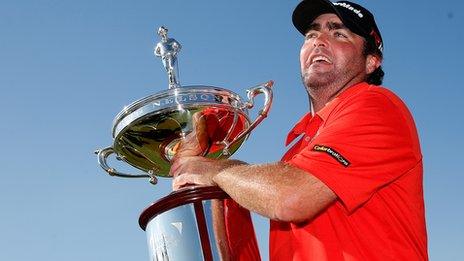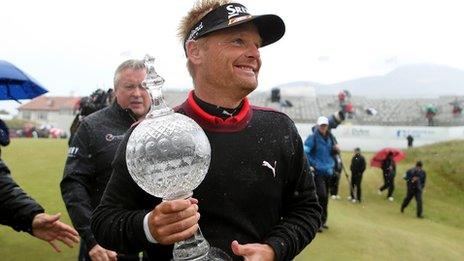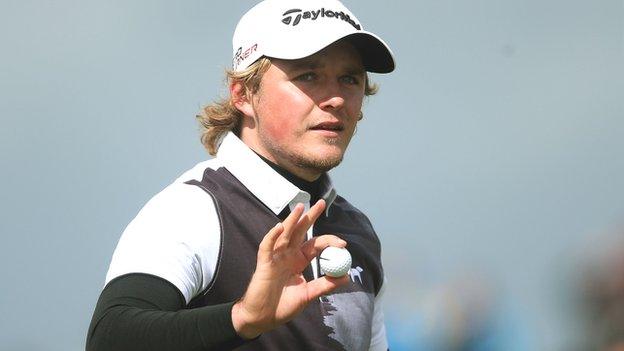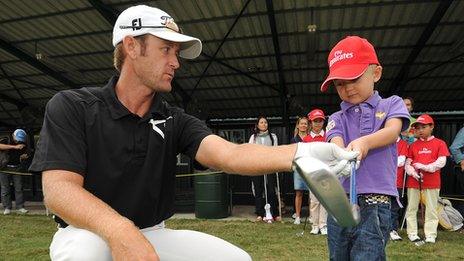Irish Open showed the links effect will make its mark this summer
- Published
- comments
Kjeldsen holds nerve in Irish Open play-off
Golf was a different and more difficult game on the firm, fast links of Royal County Down, but the Irish Open will be shown to have been a perfect precursor when the game's biggest trophies are on the line.
The tournament, promoted by world number one Rory McIlroy, heralded the start of an unprecedented and exciting spell of seaside golf that includes the next two majors as well as the Scottish Open.
The skills that were required in Northern Ireland are the ones that will be most useful at Chambers Bay, Gullane and St Andrews. They could also be handy at the lakeside Whistling Straits which hosts the PGA Championship in August.
Later this month the US Open heads to the environs of Seattle and a largely unknown Chambers Bay course. Thereafter East Lothian hosts the Scottish Open before we head to the Old Course for the Open.

Soren Kjeldsen had an advantage over his competitors, saying he "loves playing in the wind"
This summer could well be remembered as a festival of links golf and Royal County Down provided ideal preparation.
The cool, blustery and squally conditions endured throughout Soren Kjeldsen's Irish Open triumph may also prevail at the US Open. Certainly on the west coast of America there is every chance winds will have that "heavy" feel synonymous with the British seaside.
In 2010, Portrush native Graeme McDowell remarked on how familiar he was with the weather on his way to US Open victory at Pebble Beach.
Chambers Bay is further north and if it's firm and fast, those who braved the brutal test of RCD have snuck themselves a significant advantage.
"It's been a real baptism of fire I think for all the links golf that I've got ahead of me over the next couple of months," McDowell said after a closing 75 left him seven over par on his return to Northern Ireland.

Chambers Bay sits 40 miles south of Seattle on the Pacific coast of the United States
"I need to get back to the golfer I used to be when I was a kid, being able to play in these conditions. You lose that creativity that you need.
"You play far too much straightforward golf, I guess, and not enough of this stuff. It's really cool and I've really felt like it's been great preparation, this week, for the summer."
The US Open is regarded as the toughest of the majors, with level par usually considered a score worthy of victory. At the Irish Open two under made the play-off and only five players finished under par.
"They always say you should try and make your preparation harder than the real thing. This certainly felt harder than any US Open could be," McDowell added.
All aspects of a golfer's game receive a stern examination on a breezy links. The usual diet of "dartboard" golf is no use because balls don't obediently stop on landing.
Instead players have to calculate how far a ball will run and how much the wind will affect the lines of drives, putts, pitches and chips, especially on exposed greens.

The weather was not only testing for the players - the crowds suffered too in County Down
It is golf in its purest form and it wasn't a huge surprise to hear Kjeldsen's assessment of why he won, having beaten Eddie Pepperell and Bernd Wiesberger in a sudden death play-off. "I love playing in the wind," the new champion said.
"With my game, I shape shots, I hit it low, and I rely a lot on my short game. So I think this type of golf certainly suits me better than maybe playing in the desert or something."
One can't play links golf purely by numbers. Imagination is a far more valuable commodity.
"Even though our yardage books are incredibly detailed and very good; it's impossible to put everything down on paper that you need to know to play this course well," Kjeldsen added.
It is good that Open places were up for grabs too. Kjeldsen, Pepperell and Tyrell Hatton beat a high calibre field in the most appropriate form of the game to earn their spots at the home of golf.
"I've never played an Open before, so for St Andrews to be my first one is going to be quite special," said Oxfordshire pro Pepperell. He was brilliantly bogey free in his final round 69.

St Andrews is host to the Open Championship in July
"The fact that we play there every year [in the Alfred Dunhill Links], I think can only help. I'll go there pretty confident."
A less enthusiastic view was expressed by former champion Shane Lowry. Frustrated by poor putting, he believed exemplary ball striking can go unrewarded in this form of the game.
"A few bad bounces here or there is the way links golf goes. Maybe parkland rewards better golf," the Irishman said.
Lowry wasn't alone in struggling. McIlroy blew out at the halfway stage after his first round 80 and Rickie Fowler ended his third round with a pair of eights.
To be fair to Fowler, he possesses the creativity and patience (especially in bad weather) to be regarded as a links specialist. He will play at Gullane and should be a threat there as well as at the next three majors.
McIlroy's toils on a course that his Ryder Cup skipper Darren Clarke described as "fair but very, very tough," suggest there's still room for improvement when these conditions prevail.
Rory McIlroy disappointed by Irish Open exit at Royal Co Down
However, last Friday he played pretty well, battling to try to make the weekend. There was enough to suggest that, once refreshed, he can grind his way into contention in the coming weeks.
And it is most likely to be a grind. That's the nature of the form of golf that will decide the biggest titles this summer and they better be ready for it.
One of England's emerging talents, Andy Sullivan, finished strongly at the Irish Open and now believes he can reap the benefits.
"I'm looking forward to going to them now whereas before I was a little dreading them," the Warwickshire man said of the Scottish Open and Open.
It is those whose appetites were genuinely whetted in Northern Ireland and willing to embrace the vagaries of the links who are most likely to prosper.
- Published1 June 2015

- Published31 May 2015

- Published1 June 2015

- Published28 September 2018

- Published19 July 2016
